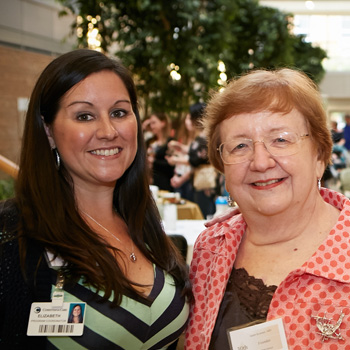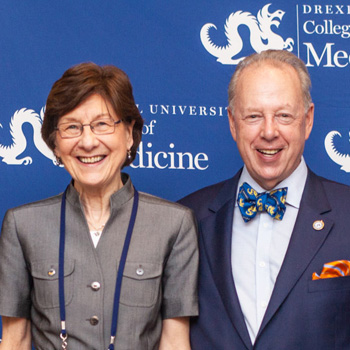Great Minds Think Alike

By Nancy West
Two alumnae of the Woman's Medical College Class of 1968 struggled financially to attend medical school. While their families were supportive of their aspirations to become physicians, neither had the financial resources to help their daughters go to Drexel's predecessor medical school. Both women worked their way through medical school, which added significantly to the burden of their studies.
As a result of their experiences, Janet Phillips Kramer, MD, and Patricia Crumrine, MD, independently decided to help current Drexel medical students by making a planned gift to establish scholarships for women and other students who might not otherwise be able to afford a medical education.

At the 30th anniversary of First State School: founder Janet Kramer, MD (right), and program director Elizabeth Houser, Christiana Care MSN, RN. Photo credit Christiana Care.
"When I was going to medical school, I knew a lot of women who wanted to go but couldn't afford it and weren't encouraged," recalls Kramer. "At that time, it was harder for women to get financing for medical school. I was lucky because my parents encouraged me to go, even though we had financial difficulties. My father became ill, had no health insurance and needed some very expensive medical services. He died before my junior year in medical school.
"Woman's Medical College was the only school that was willing to take a risk on me, because I really didn't have any way of paying for it," she continues. "The college helped by giving me a financial assistantship to run the bookstore. As a freshman, you started as a clerk, and by the time you were a senior, you became director of the store. In return, I received my books for free plus a small stipend in my senior year."
The rest of Kramer's funds came from working a lot of odd jobs, from the time she was in high school until she was a junior in medical school, and from education loans for both college and medical school.

At the Golden Dragon Ceremony: Patricia Crumrine, MD, and Dean Daniel V. Schidlow, MD. Photo credit Charles Shan Cerrone.
Crumrine, as well, paid for her medical education. "My family helped with some of my college education, but I had a sister who also wanted to go to college, and they wanted to help her too," she explains. "So I was on my own for medical school."
Crumrine worked all the way through undergraduate school and also worked in the bookstore at the medical college. She took out loans to pay for her third and fourth years.
Although she graduated with debt, it doesn't compare to the debt that students face now, Crumrine points out. "The magnitude of debt that medical students incur today really hampers their ability to do other things in life as they repay those debts and then try to raise families and buy homes," she remarks. This was a major impetus behind her planned gift to Drexel College of Medicine.
In addition, future doctors are uncertain about the reimbursement they will receive and whether they are going to be able to pay back those debts. "Medicine has changed," Crumrine says, noting the proliferation of corporate structures. "Many of these corporations are staffing urgent care centers with mid-level providers instead of physicians. This trend in health care will impact the number of people deciding to pursue the medical profession, particularly in the areas of primary care, internal medicine and pediatrics."
I want to help them feel that they don't have to work during medical school but rather spend their time studying and interacting with other people — not worrying about where the next dollar is coming from.
Patricia Crumrine, MD
Crumrine hopes that her planned gift will help students to consider medical school without incurring such huge debt. "I want to help them feel that they don't have to work during medical school but rather spend their time studying and interacting with other people — not worrying about where the next dollar is coming from."
Kramer and her husband set up a scholarship fund to encourage students who showed a commitment and promise to continue their education in medical school. "Financial need is the major reason for awarding the scholarship," she says. "It can be given to any student who needs the funding."
Both Kramer and Crumrine have enjoyed distinguished careers.
Kramer, now retired, was an internist with a subspecialty in adolescent medicine. After 23 years in private practice, she became director of Adolescent and Young Adult Medicine at Christiana Care Health System in Delaware. She developed and directed the Adolescent Medicine Fellowship and First State School, the first hospital-based school in the country to provide medical services for students with chronic illness, while they receive ongoing onsite education from the public school district.
Also while Kramer was director, Christiana Care won the contract to provide health services for youth in Delaware's residential and correctional facilities. That program continues today. Kramer serves as a physician surveyor for the National Commission on Correctional Health Care and continues to advocate for health services for incarcerated youth.
Crumrine is a specialist in pediatric neurology. She is a professor of pediatrics at the University of Pittsburgh School of Medicine and an attending physician for the Epilepsy Monitoring Unit at the Children's Hospital of Pittsburgh of UPMC, where she is also an electroencephalographer. She previously served as director of EEG, the Medical Epilepsy program and the Child Neurology Residency program.
Crumrine is a former chair of the American Board of Psychiatry & Neurology and has held leadership roles with numerous professional associations. She has presented her research on anticonvulsant drug treatment of epilepsy in children to national and international conferences. She currently serves on exam writing committees for the American Board of Psychiatry & Neurology and is chair of the Epilepsy Exam Committee.
When Crumrine and Kramer began medical school in 1964, they couldn't have imagined all that lay ahead. Now they will help ease the way for those who come after. Kramer hopes that her gift will encourage other alumni to give back. "Those who have benefited from encouragement and a good education should consider supporting the institution and its students. I am very grateful to the College of Medicine for allowing me to pursue a challenging and fulfilling career."
Back to Top